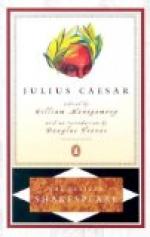|
This section contains 6,287 words (approx. 21 pages at 300 words per page) |

|
SOURCE: Nuttall, A. D. “Brutus's Nature and Shakespeare's Art.” In Modern Critical Interpretations: William Shakespeare's Julius Caesar, edited by Harold Bloom, pp. 105-20. New York: Chelsea House Publishers, 1988.
In the following essay, originally published in 1983, Nuttall traces the ways in which Shakespeare infused Brutus's character with such abstract qualities as Stoicism, pathos, egotism, shame, and rationalization in order to produce a well-rounded, psychologically distinct character capable of eliciting audience sympathy.
The eighteenth century was profoundly excited by the then novel intuition that Shakespeare's works conveyed the nature of the real world. This excitement lasted well through the nineteenth century and still rises, unbidden, in the untheoretical reader, even today. But in the twentieth century formalism came to Shakespeare criticism before it appeared elsewhere. The origins of this formalism, indeed, lie outside the twentieth century and outside England. Gustav Rümelin's Shakespearestudien (Stuttgart, 1866) is an important early essay in...
|
This section contains 6,287 words (approx. 21 pages at 300 words per page) |

|


